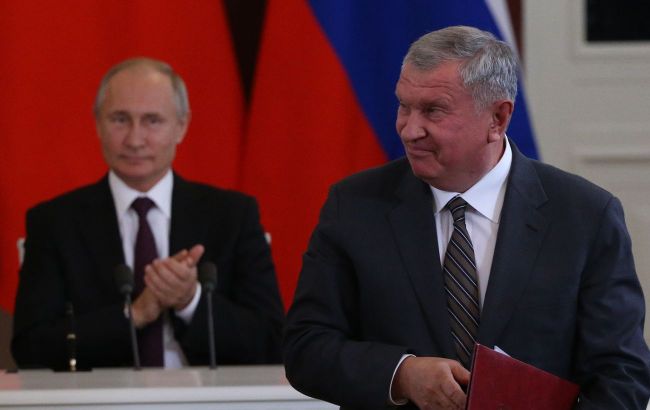Oil traders' clash hits Rosneft and blows a hole in Putin's budget – Bloomberg
 Photo: Vladimir Putin and Igor Sechin (Getty Images)
Photo: Vladimir Putin and Igor Sechin (Getty Images)
A serious conflict between key figures in Russia’s oil business is threatening the export system the Kremlin relies on to finance its war against Ukraine, reports Bloomberg.
Traders controlling most of Rosneft’s oil supplies have begun exposing competitors’ ties to Russia, trying to trigger Western sanctions against them.
Fight for influence on the oil market
Based on sources and internal documents, the confrontation between oil trader Murtaza Lakhani and two Azerbaijani businessmen, Etibar Eyyub and Tahir Garayev, has already cost Rosneft and the Russian state billions of dollars.
Due to discounts and rising costs, the situation poses a threat to the company’s CEO Igor Sechin.
After the US first imposed sanctions on Rosneft, and Russia’s economy continues to weaken, Vladimir Putin has found himself in a difficult position. Rosneft’s income for the first half of the year fell by 68%, while oil prices have dropped nearly 20% from their January highs.
Now, the new conflict within the export network threatens even greater financial losses.
Accusations and media fight
Sources told Bloomberg that allies of Eyyub and Garayev tried to publish materials in Russian media to draw Western attention to Lakhani’s ties with Rosneft. In response, Lakhani launched his own campaign, attempting to put his rivals on the radar of Western regulators.
Coral Energy, a company founded by Garayev in 2010 (later renamed 2Rivers), even turned to lobbyists in Washington to bring information about competitors’ activities to the attention of American and European officials.
Such tactics have been used before in gray oil trading schemes, where exposing rivals led to sanctions and loss of partners.
Sanctions and Rosneft’s revenue decline
After the UK and the EU imposed sanctions in 2024 against the Azerbaijani traders’ network, their business faced severe restrictions. Banks, insurance companies, and brokers began avoiding deals with them, and every contract became more expensive.
As a result, Rosneft was forced to offer additional discounts and seek alternative supply routes, which led to new losses. According to sources, total damages for the company and the Russian budget amount to billions of dollars.
How Russia is losing control over its oil network
“These disputes expose how fragile Russia’s sanctions-bypass system really is,” said Tatiana Mitrova, an expert at Columbia University’s Center on Global Energy Policy. According to her, the Kremlin relies on a limited circle of opaque intermediaries to export oil and receive hard currency.
“When they start fighting, it threatens billions in export revenue and reveals how little control Moscow actually has over these offshore networks,” she said.
The rise and fall of oil intermediaries
Lakhani, Eyyub, and Garayev are little-known to the public, but since Russia invaded Ukraine, they have handled the flow of hundreds of millions of barrels of Russian oil. Lakhani, who once called himself “Glencore’s man in Baghdad,” became Sechin’s key partner after 2022, bypassing Western sanctions through a network of companies in the UAE.
However, in 2024, his position weakened as Eyyub and Garayev quickly became Rosneft’s main traders. Their structure, operating through offshore entities and supported by ties in the Azerbaijani government, pushed Lakhani out of the market. But by 2025, he had returned, strengthening his base in Dubai and again serving as an intermediary between Moscow and Asian partners.
A new threat to Rosneft and the Kremlin
Lakhani’s resurgence angered the sanctioned Azerbaijani traders, who intensified their information attacks. For Sechin, this has become another problem amid falling profits and sanctions pressure.
“It’s a symptom of growing stress inside Russia’s wartime economy,” Mitrova concluded. According to her, dependence on a small group of intermediaries makes Russia’s oil system extremely unstable.
Trump's sanctions
The United States imposed tough sanctions against Russian oil companies Rosneft and Lukoil.
Bloomberg sources have already reported that Russian oil flows to India, which surged after Russia invaded Ukraine, will soon shrink almost to zero.
According to Reuters sources, the sanctions have prompted Chinese state oil companies to temporarily suspend purchases of Russian oil.

